
Georgios Petropoulos
Georgios Petropoulos joined Bruegel as a visiting fellow in November 2015 and was a resident fellow from April 2016 to February 2022. Since March 2022, he is a non-resident fellow. He is Research Associate at MIT, Digital Fellow at Stanford University and CESifo Network affiliate. Georgios’ research focuses on the implications of digital technologies on innovation, competition policy and labour markets. He is currently studying how digital platforms should be regulated, what the relationship between big data and market competition is, as well as how the adoption of robots and information technologies affect labour markets, employment and wages. He holds a Bachelor’s degree in Physics, Master’s degrees in mathematical economics and econometrics and a PhD degree in Economics. He has also studied Astrophysics at a Master's level.
Disclaimer of external interests
Featured work
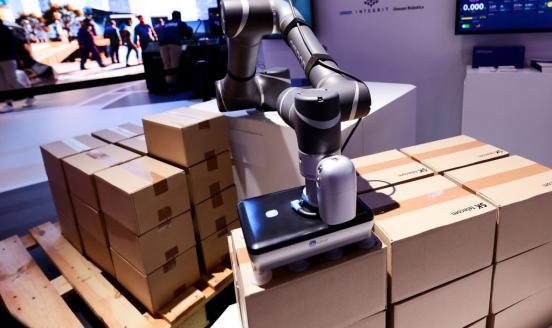
Artificial intelligence: how to get the most from the labour-productivity boost
Artificial intelligence should boost productivity over time. The boost can happen sooner, and last longer, with the right policies.
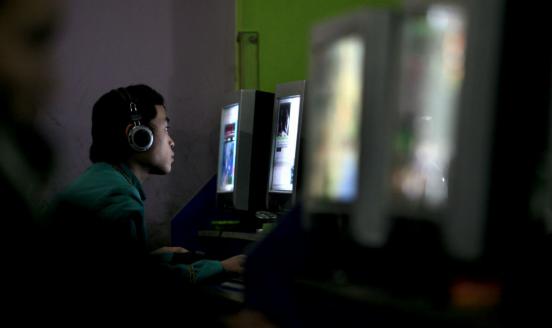
Web3: the next internet revolution
Tokenisation based on blockchain technology could bring radical changes to markets for goods and services.
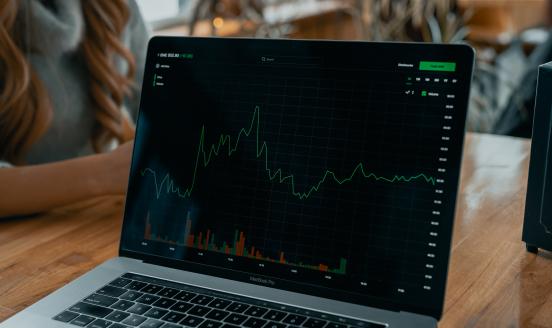
Who will enforce the Digital Markets Act?
While the Digital Markets Act entered its first trilogue, what will be the enforcement role of the Commission and the Member States?

The dark side of artificial intelligence: manipulation of human behaviour
Transparency over systems and algorithms, rules and public awareness are needed to address potential danger of manipulation by artificial intelligence
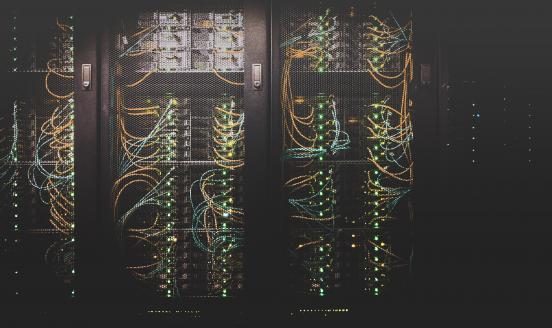
'In Situ' Data Rights
Privacy empowers individuals to control what is gathered and who sees it; portability permits analysis and creates competition. By moving our data to

Towards efficient information sharing in network markets
In this paper, we turn our attention to market failure due to information asymmetry between platforms and their users and between competing platforms.

Concentration of artificial intelligence and other frontier IT skills
Online job postings indicate that demand from top tech firms for frontier IT skills is about double their demand for other IT skills.

Making antitrust work for, not against, gig workers and the self-employed
Policymakers should act to deal with labour-market concentration trends that potentially harm workers, especially gig workers and the self-employed.

Opening up digital platforms and reducing anticompetitive risks
The current convergence in measures to open up digital platforms leaves a door open to some form of international coordination.

Platform mergers and antitrust
Should internet era merger policy differ from industrial era merger policy? This paper was published in Industrial and Corporate Change by Oxford Univ

Remote work, EU labour markets and wage inequality
More remote working in the wake of the pandemic could exacerbate wage inequality, with young workers, women and the low educated potentially losing ou

The great infodemic: time to consider a fake news tax
A content-based tax on the revenue from digital advertising is needed to prevent the monetisation of fake news by both creators and platforms.

Platform mergers and antitrust
This paper sets out a framework for addressing competition concerns arising from acquisitions in big platform ecosystems. This is a June 2021 update

Stability of collusion and quality differentiation: a Nash bargaining approach
How do incentives to collude depend on how asymmetric firms are? For low levels of differentiation, an increase in quality difference makes collusion
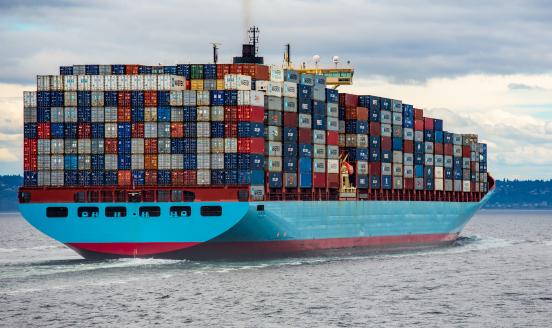
The coming productivity boom
AI and other digital technologies have been surprisingly slow to improve economic growth. But that could be about to change.
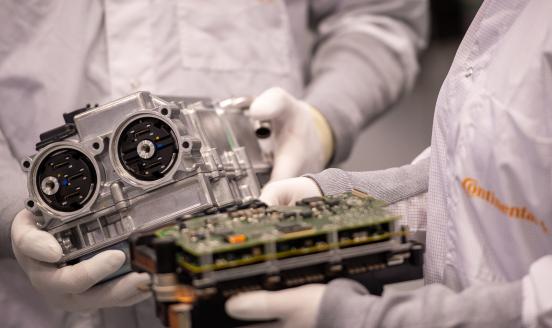
The work of the future: How are new jobs created and what are the implications for labour markets?
Join us for a presentation of 'New Frontiers: The Origins and Content of New Work, 1940 — 2018' by David Autor, followed by a discussion.

Platform mergers and antitrust
This paper sets out a framework for addressing competition concerns arising from acquisitions in big platform ecosystems.

Europe and India: Comparing Approaches to Global Economic Challenges
Stakeholders from government, private sector, media and academia/institutions come together to review India-EU relations.
Digital Platforms, Regulation and Competition: What's next for Europe?
Will the new rules of the internet go far enough for consumers and creators? Should we regulate platforms or will a code of conduct suffice?

Data flows, artificial intelligence and international trade: impacts and prospects for the value chains of the future
In-depth briefing and analysis on the issues of digital trade and the geopolitics of trade provided to the European Parliament.

Digital platforms and antitrust
The market power of online platforms raises concerns that they may engage in anti-competitive practices, but traditional (ex-post) antitrust intervent

How to keep a competitive environment while engaging with non market economies?
How can we ensure fair competition between European firms and Chinese state-backed players?
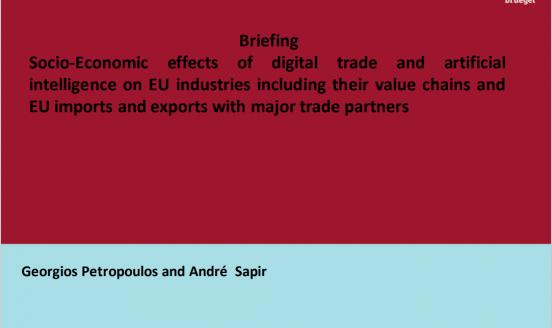
Socio-economic effects of digital trade and artificial intelligence on EU industries including their value chains and EU imports and exports with major trade partners
Testimony before the European Parliament on the subject of digital trade.

Job polarisation and the Great Recession
A job polarisation trend has seen relatively more workers in the European Union employed in skilled and unskilled jobs, while mid-skilled jobs have be

Bruegel Annual Meetings 2020 - Day 2
Second day of Bruegel Annual Meetings.
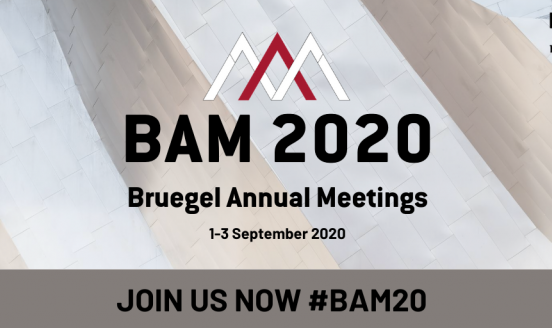
Bruegel Annual Meetings 1-3 September, 2020
Bruegel's flagship event transformed into a virtual conference for pandemic times

Artificial intelligence’s great impact on low and middle-skilled jobs
Artificial intelligence and machine learning will significantly transform low-skilled jobs that have not yet been negatively affected by past technolo
The role of AI in healthcare
How can AI help us fight through a pandemic crisis?

Long-term transmission rights and dynamic efficiency
We compare market designs for access regulation of a bottleneck transmission line, and study their impact on investment decisions by an incumbent firm

Occupational change, artificial intelligence and the geography of EU labour markets
On the potential impact of new technologies, we find that low-skill mid-skill jobs are significantly exposed.

Look but don't touch: (how) will social distancing work against COVID-19?
How do social distancing measure work to contain the coronavirus and what is the probability we will have a second outbreak?

Artificial intelligence in the fight against COVID-19
Artificial intelligence can help fight the coronavirus through applications including population screening, notifications of when to seek medical help
CANCELLED: India-EU Partnership: New Vistas for the Next Decade
Policymakers, academics and private sector actors from the EU and India come together to work on common issues and explore further areas of cooperatio
Global competition and digital change: How should we update European competition policy?
The event addressed the need for modernising European competition policy due to structural changes in the economy caused by shifting global economic l
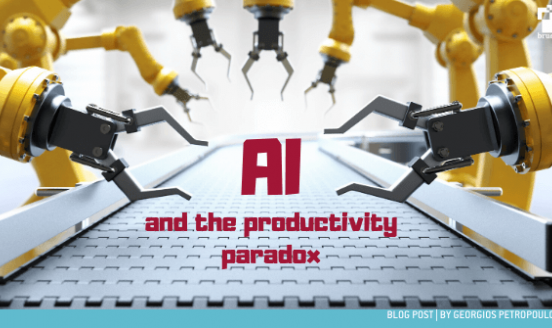
AI and the Productivity Paradox
In this blog post, I review the main explanations for this paradox and I briefly discuss relevant policy options in order to increase the contribution
How should we measure the digital economy?
This event looked at how to measure the value and contribution of free online goods that are not captured in macroeconomic variables like GDP.
The Great Reversal-Causes and implications of the rising corporate concentration in the US
During this event, Thomas Philippon presented his thesis on market concentration and explained the reasons behind the rising corporate market power in

Work Protection in the Digital Age: Towards a new social contract
Over the past few years, new business models have emerged, empowered by digital technologies. These have disrupted a range of activities, from food de

How should the relationship between competition policy and industrial policy evolve in the European Union?
Competition policy aims to ensure that market practices and strategies do not reduce consumer welfare. Industrial policy, meanwhile, aims at securing

Digitalisation and European welfare states
EU policymakers must find answers to pressing questions: if technology has a negative impact on labour income, how will the welfare state be funded? H

What can the EU do to keep its firms globally relevant?
There is a fear that EU companies will find it increasingly difficult to be on top of global value chains. Many argue that EU-based firms simply lack

Contribution to Growth: The European Digital Single Market
Numerous legislative measures have been initiated or enacted in support of the overall achievement of a Digital Single Market (DSM). This in-depth ana
Market power and its implications to competition policy
What are the reasons behind the global trends in corporate margins and market concentration?
Empirical trends in markups and market power: implications for productivity and growth
Empirical trends in markups and market power: their implications for productivity and growth
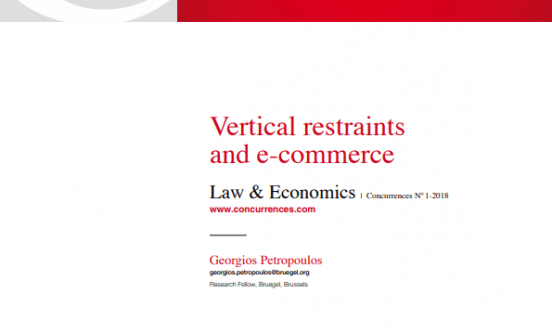
Vertical restraints and e-commerce
This article wishes to provide guidance on how the new vertical restraints linked to e-commerce should be treated and recommendations over the priorit

Ethics and artificial intelligence
Machine learning and artificial intelligence (AI) systems are rapidly being adopted across the economy and society. Early excitement about the benefit
Emerging Trends in Competition Policy - A Global Perspective
How is global competition policy evolving given the challenges of the digital era?
Civil society for the digital age
What is the place of civil society in the digital age as well as the role of technology in society?

The impact of artificial intelligence on employment
Technological development, and in particular digitalisation, has major implications for labour markets. Assessing its impact will be crucial for devel

Robots, ICT and EU employment
Disruptive technologies based on ICT, robots, and artificial intelligence have transformed labour markets through their important effects on employmen

Misinformation & missing information: a fix for fake news
This event hosted Professor Marshall van Alstyne who presented his research on fake news and on the potential solutions of the associated problems. A
Youth up Europe: The future of work: towards safeguarding young people's rights in the era of increased digitisation
This event will discuss what impact digitisation will have on the employment opportunities for young people and how we can safeguard their rights.

How e-commerce reshapes markets and firms’ strategies
The development of e-commerce has affected both demand and supply fundamentals of markets, changing the way competition works. In the effort to develo

Challenges and opportunities for the EU digital single market
At this event, we looked into the progress made towards achieving the main priorities for strengthening the digital single market, the opportunities a
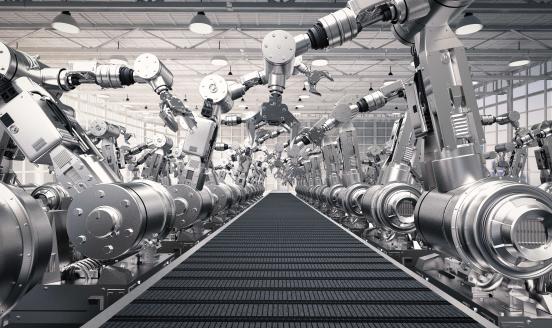
The impact of industrial robots on EU employment and wages: A local labour market approach
In theory, robots can directly displace workers from performing specific tasks (displacement effect). But they can also expand labour demand through t

Robots and artificial intelligence: The next frontier for employment and EU economic policy
This event looked at the impact of robotics and artificial intelligence on employment, wages and EU economic policy.

Collaborative Economy: Market Design and Basic Regulatory Principles
Despite the efficiencies and benefits associated with the collaborative economy, there are concerns about how it can be properly regulated. The differ

State aid and tax rulings: Clarifying the European Commission's approach
State aid is considered illegal under EU law. However, more clarity over the main characteristics of tax measures that can constitute state aid is nee
The implications of Blockchain platforms
The disruptive forces of block chain technologies in markets and industries: a European perspective
Corporate taxation in the digital era
How can we address digital taxation in the EU? Is the proposed "equalisation tax" on turnover the best policy to tackle the challenges posed by digita
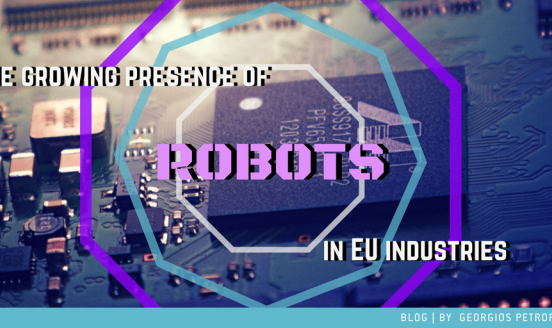
The growing presence of robots in EU industries
While it is always tempting to try to predict future patterns in the automation of European industries, it is also insightful to assess key dimensions
Antitrust Concerns in Digital Markets
Following our past events on the topic of antitrust concerns in zero price markets and on big data, digital platforms and market competition, this Nov
Crowd Employment
This event aims to discuss the various nuances and diversity that characterize crowd employment.

Remaking Europe: the new manufacturing as an engine for growth
Europe needs to know how it can realise the potential for industrial rejuvenation. How well are European firms responding to the new opportunities for
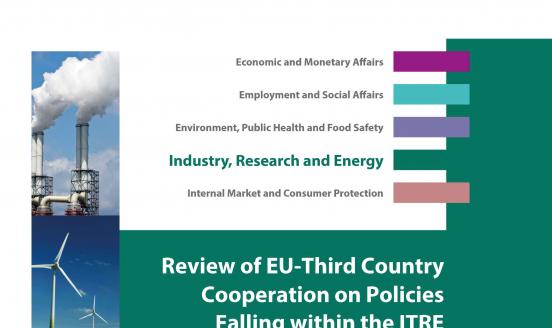
Review of EU-third country cooperation on policies falling within the ITRE domain in relation to Brexit
What is the possible future relationship between the EU and the UK in light of Brexit? The report provides a critical assessment of the implications o
Fintech and the digital transformation of banking
FinTech is changing the financial sector. What are the challenges associated with this and what policies should we adopt in response?
Geo-blocking in the digital single market
Geo-blocking is a discriminatory practice that is wide-spread in EU. It prevents online customers from accessing and purchasing products or services f
Standardisation and patents: problems and policy options
Bruegel together with the Association for Competition Economics (ACE), is hosting an event on standardization and SEP licensing.
Do we understand the impact of artificial intelligence on employment?
Artificial intelligence is already transforming the world of work, but the future is hard to predict. Some see most jobs at risk of automatisation, wh
Machines that learn to do, and do to learn: What is artificial intelligence?
Artificial intelligence is much talked about, but what exactly is it? Georgios Petropoulos explores the origins, methods and potential of machine lear
Artificial intelligence: challenges and opportunities
Rob Atkinson, the founder and president of the Information Technology and Innovation Foundation presented his research work on the impact of artificia
Intellectual Property and Competition Policy in Europe and Japan
Intellectual property (IP) is a cornerstone for incentivising innovation initiatives. It defines a framework within which firms and individuals can pr
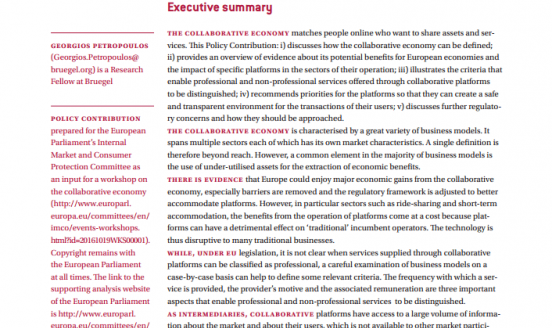
An economic review of the collaborative economy
This Policy Contribution tackles the definition and benefits of collaborative economy, as well as the distinction between professional and non-profess
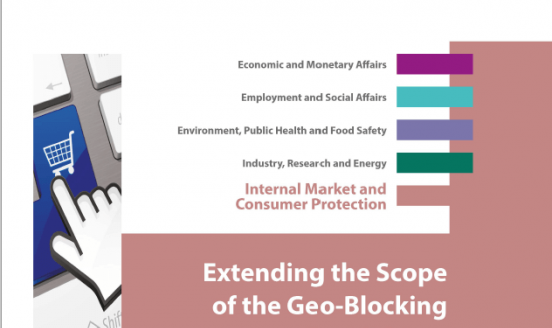
Extending the scope of the geo-blocking prohibition: an economic assessment
This paper was prepared for the European Parliament at the request of the Committee on Internal Market and Consumer Protection.
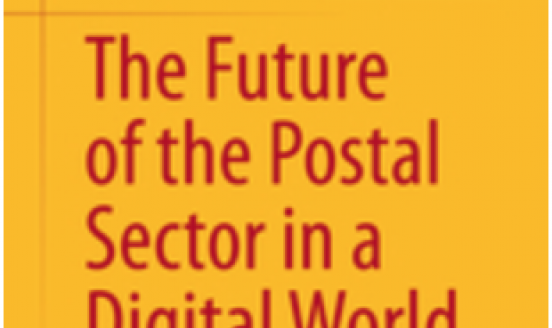
The Future of the Postal Sector in a Digital World
Addresses major current problems in postal and delivery sector worldwide
Search engines, big data and network effects
Search engines are intermediaries in a two-way market between users and advertisers. Their huge stocks of data about users and their preferences can h
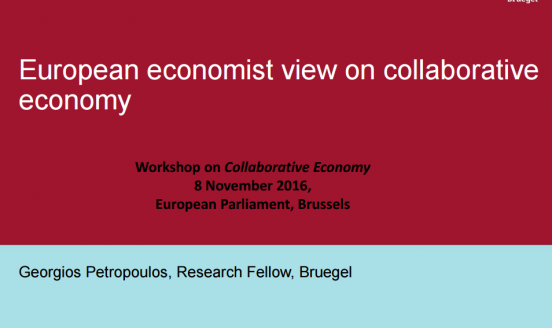
Collaborative economy
Georgios Petropoulos was invited to speak at a workshop on collaborative economy organised by the Internal Market Committee (IMCO) of the European Par
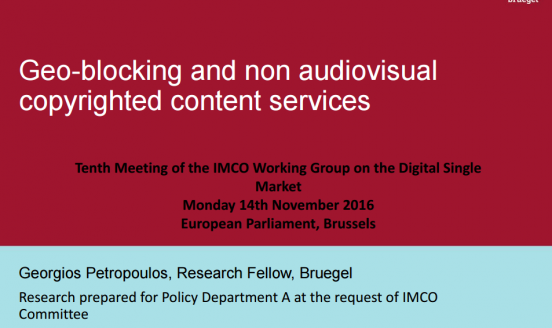
Geo-blocking and non audiovisual copyrighted content services
Georgios Petropoulos attended a meeting of IMCO Working Group on the Digital Single Market on November 14.
Antitrust concerns in zero price markets
"Free" products and services are the latest trend but many of those are not actually free. Consumers are exchanging their data for them. Only recently
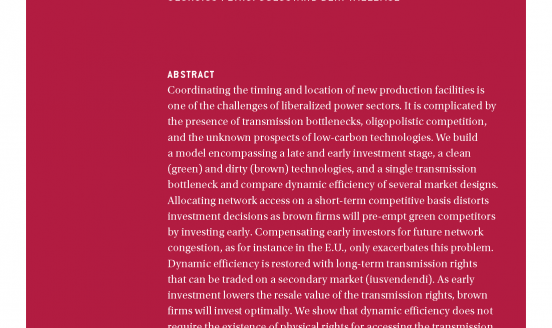
Providing efficient network access to green power generators: A long-term property rights perspective
This paper analyses the dynamic efficiency of several types of access regulation of a bottleneck transmission line in electricity markets.
Value-added tax challenges for cross-border commerce and SMEs
Digital platforms: A policy and research agenda
The number of digital platforms is currently rising in many countries and sectors. What are the opportunities of platforms and which kind of regulatio
Innovation and economic reform in Europe and Japan
This event is co-organised by Bruegel and the Kobe University Graduate School of Economics.
Big data, digital platforms and market competition
How does big data generate economic value for firms and individuals? How should we respond to potential antitrust concerns?
Brexit and its potential impact on international data transfers
If the UK exits the EU and the EEA, it will have to go to considerable lengths to enable continued data transfers from the EU. Without an agreement o
Brexit and competition policy in Europe
If the UK leaves the EU without any agreement in place, this could change the way that competition law is applied. It could also make antitrust cases
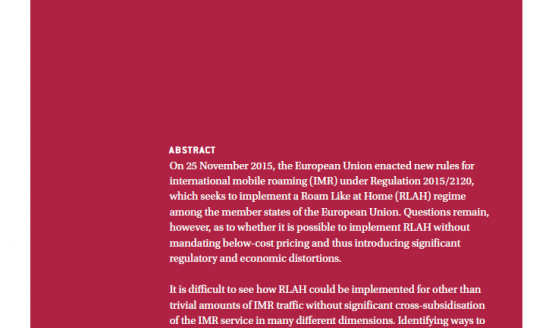
Challenging prospects for roam like at home
In 2015 the European Union adopted new rules seeking to implement a roam like at home regime for member states. This Working Paper highlights challeng
Internet taxation: challenges and policy recommendations
As the economy moves online, it becomes more difficult for national tax authorities to collect revenue. How great is the impact, and what should corpo
European e-commerce needs better visibility into cross-border delivery prices
Consumers, retail shippers, and European and national regulatory authorities could benefit from enhanced visibility into the price of shipping goods a

E-commerce in Europe: parcel delivery prices in a digital single market
The expansion of e-commerce, a substantial growth opportunity for Europe, is hampered by high cross-border parcel delivery prices. This paper analyse
German Facebook probe links data protection and competition policy
On March 2, 2016, the German Federal Cartel Office opened an antitrust investigation into Facebook’s contract clauses on data use, in what appears to
Uber and the economic impact of sharing economy platforms
Consumers enjoy the cheaper taxi services provided by Uber, but the company has proven divisive among taxi drivers. Regulators should allow Uber to op
The Sharing/Collaborative Economy
The collaborative economy is transforming business and society, but what are the implications for traditional industries and the potential role of reg
The economic value of personal data for online platforms, firms and consumers
Data is often referred to as the ‘oil of the twenty-first century'. This article reviews how personal data generate economic value for the three major
Data transfers under the threat of terrorist attacks
The recent terrorist attacks in Paris and elsewhere have created an atmosphere of insecurity and fear among the citizens of the main European capitals